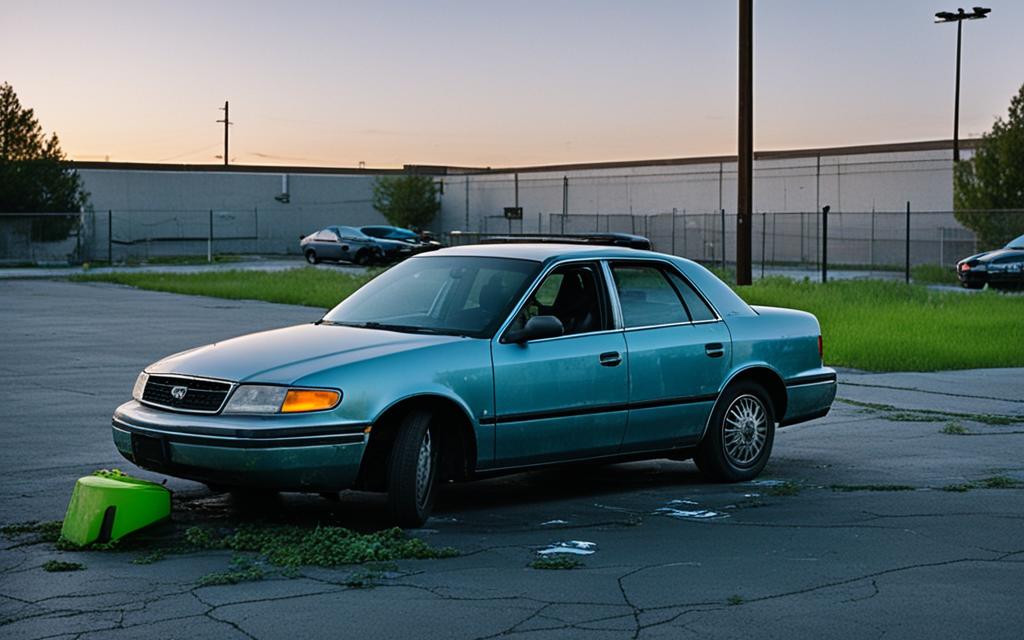If you’ve recently had your car repossessed, you may be feeling overwhelmed and unsure of what steps to take next. But don’t worry, we’re here to help. In this article, we will provide you with valuable insights and guidance on how to recover your repossessed car quickly, so you can get back on the road in no time.
Repossessions can happen for various reasons, such as missed payments or financial difficulties. But regardless of the circumstances, it’s essential to be proactive and knowledgeable about the recovery process. By knowing the right steps to take and understanding your rights, you can increase your chances of a smooth and swift repossession recovery.
Key Takeaways:
- Educate yourself about repossession laws and regulations
- Act promptly and contact your lender or repossession agency
- Gather and provide all necessary documentation
- Establish a positive working relationship with your lender or repossession agency
- Consider legal assistance if encountering challenges during the process
Understanding Repossession and Retrieval
Before we delve into the timeline for getting back your repossessed car, it’s crucial to have a clear understanding of the repossession process and the general timeline for vehicle retrieval. By familiarizing yourself with these concepts, you can navigate the repossession recovery process more effectively and increase your chances of reclaiming your car.
What is Repossession?
Repossession refers to the legal process through which a lender or financial institution takes possession of a vehicle due to the borrower’s failure to make timely loan payments. When you default on your car loan, the lender has the right to repossess the vehicle as collateral.
Repossession is a serious consequence of loan default and can have significant implications for your credit score and future financial stability.
Once your car has been repossessed, it enters a phase known as the retrieval process, during which you have an opportunity to reclaim ownership of the vehicle. This process involves certain steps that you need to follow to initiate the recovery of your repossessed car.
Turnaround Time for Repossessed Vehicle Retrieval
The timeframe for repossession and vehicle retrieval can vary depending on several factors, such as the specific state laws, the lender’s policies, and the efficiency of the repossession agency. While it’s difficult to provide an exact timeline, the typical turnaround time for repo car retrieval ranges from a few days to a couple of weeks.
This timeframe includes the repossession itself, the notification process, and any waiting periods mandated by law before the lender can sell the repossessed vehicle. It’s important to note that this timeframe is an estimate, and individual cases may vary.
To better understand the repo car timeline, let’s take a look at a table summarizing the key stages of the repossession and retrieval process:
| Stage | Duration |
|---|---|
| Repossession | Usually occurs within a few days of defaulted payments |
| Notification | Typically within 5-10 days post-repossession |
| Waiting Period | Varies by state; usually 10-15 days |
| Vehicle Sale | After the waiting period (if the car is not redeemed or reinstated) |
It’s important to act promptly if you want to maximize your chances of reclaiming your repossessed car. Now that you have a basic understanding of repossession and the retrieval process, let’s proceed to the next section, where we will discuss the initial steps to initiate the recovery process.
Initiating the Recovery Process
When it comes to reclaiming your repossessed car, taking the right steps at the beginning is crucial to initiate the recovery process effectively. This section will guide you through the necessary actions you need to take.
Contacting the Lender or Repossession Agency
Start by reaching out to your lender or the repossession agency responsible for taking possession of your car. It’s important to establish communication as soon as possible to express your intention to reclaim your vehicle. Obtain the relevant contact information and make the initial call or send an email to initiate the conversation.
Providing Necessary Documentation
During your initial contact, inquire about the specific documentation required to support your reclaiming efforts. Typical documents requested may include identification proof, vehicle registration, loan agreements, and any other relevant paperwork. Gather these documents ahead of time to streamline the recovery process and demonstrate your genuine intent.
Communicating Your Intention
Clearly articulate your desire to reclaim your repossessed car during your communication with the lender or repossession agency. Emphasize your willingness to cooperate and fulfill any outstanding financial obligations. This proactive approach can help establish a more amicable relationship, potentially expediting the recovery process.
Pro Tip: Maintain a calm and respectful demeanor throughout your interactions. Remember, establishing a cooperative and professional relationship with the lender or repossession agency can significantly increase the chances of a smooth recovery process for your repossessed car.
| Actions to Initiate the Recovery Process: | Key Benefits: |
|---|---|
| 1. Contact the lender or repossession agency | Establish communication early on |
| 2. Provide necessary documentation | Streamline the recovery process |
| 3. Clearly communicate your intention | Establish a cooperative relationship |
By following these initial steps and promptly initiating the recovery process, you position yourself for a smoother journey towards reclaiming your repossessed car.
Working with Your Lender or Repossession Agency
Establishing a positive working relationship with your lender or repossession agency is crucial when it comes to retrieving your repossessed vehicle promptly. Effective communication and negotiation can significantly increase your chances of a smooth and swift car recovery process.
Here are some tips to help you navigate working with your lender or repossession agency:
- Open Lines of Communication: Reach out to your lender or repossession agency as soon as possible to express your intention of reclaiming your vehicle. Ensure that you have the necessary contact information to avoid any delays.
- Provide Required Documents: Gather all the required documentation, such as vehicle ownership proof, identification papers, and any relevant financial information, to demonstrate your eligibility for repossession recovery.
- Be Accommodating: Be open to negotiations and willing to work with your lender or repossession agency to find mutually beneficial solutions. This can include discussing repayment options or exploring alternative arrangements.
- Be Proactive: Take the initiative to follow up regularly and keep the lines of communication open. This demonstrates your commitment to retrieving your repossessed vehicle and prompts your lender or repossession agency to prioritize your case.
Remember, maintaining a respectful and professional attitude throughout the process can go a long way in ensuring a prompt return of your repossessed car.
Working with Your Lender or Repossession Agency – A Success Story
“When my car was repossessed due to unforeseen financial circumstances, I knew I had to act quickly. I immediately contacted my lender, explained my situation, and provided all the necessary documentation. Thanks to our open communication and willingness to find a solution, we were able to negotiate a manageable repayment plan. Within a few days, I retrieved my repossessed vehicle promptly and resumed my everyday life. It was a stressful situation, but by working together, we turned it into a success story!” – Sarah Thompson
Continue reading to explore the legal framework around repossession and expedite the car repossession release process in the next section.
Understanding the Legal Framework
When it comes to reclaiming your repossessed car, it’s crucial to have a solid understanding of the legal framework surrounding repossession. Familiarizing yourself with the laws and regulations governing this process can help you navigate it effectively and potentially expedite the repossession release.
One important aspect of the legal framework is the applicable local and state laws that determine the rights and responsibilities of both the lender or repossession agency and the borrower. These laws may outline specific procedures, timeframes, and conditions for repossession and recovery.
To expedite the car repossession release, it’s essential to be aware of any laws or provisions that allow for an expedited process. Some jurisdictions may offer expedited release in certain circumstances, such as cases involving extreme financial hardship or if the lender fails to comply with legal requirements.
Additionally, understanding your rights as a borrower and the obligations of the lender or repossession agency can facilitate an effective resolution. For example, knowing the timeline within which the repossession agency must release the vehicle after the debt has been satisfied can help you negotiate a prompt return of your car.
Furthermore, educating yourself about any legal defenses available to you can be advantageous. These defenses may include improper notice, wrongful repossession, or violations of consumer protection laws. By leveraging these defenses, you may be able to expedite the release of your repossessed car.
Note: It’s essential to consult with a legal professional who specializes in consumer law or repossession if you have any specific legal questions or concerns. They can provide you with personalized guidance based on your individual circumstances and the laws applicable in your jurisdiction.
Legal Framework Checklist
Below is a checklist to help you navigate the legal framework surrounding car repossession:
- Research and understand the local and state laws governing repossession and recovery
- Familiarize yourself with any expedited repossession release options provided by the law
- Know your rights as a borrower and the obligations of the lender or repossession agency
- Be aware of the timeline for repossession release after the debt has been satisfied
- Explore possible legal defenses that may apply in your situation
Example Table: Overview of Relevant Laws and Regulations
| Laws and Regulations | Key Points |
|---|---|
| State Repossession Laws | Outline procedures, timeframes, and conditions for repossession and recovery |
| Consumer Protection Laws | Provide protections for borrowers against unfair practices |
| Uniform Commercial Code (UCC) | Governs secured transactions and repossession across states |
| Federal Trade Commission (FTC) Regulations | Regulate and enforce consumer protections related to repossession |

Considering Financial Options and Negotiating
If you find yourself facing financial difficulties while trying to retrieve your repossessed car, it’s essential to explore various financial options to secure its release. Additionally, mastering the art of negotiating can help you reach a favorable agreement with your lender or repossession agency, ensuring a smoother and faster car recovery process.
Exploring Financial Options
When it comes to dealing with repossessed car recovery, it’s crucial to assess the available financial options. Here are a few strategies to consider:
- Review your budget: Take stock of your financial situation to determine the funds you can allocate towards retrieving your car.
- Consider a loan: Explore the possibility of obtaining a loan to cover the outstanding balance and fees associated with the repossession.
- Apply for financial assistance: Research organizations or programs that provide support to individuals facing financial challenges.
- Look into refinancing options: Assess the feasibility of refinancing your existing loans to free up additional funds.
Negotiating with Your Lender or Repossession Agency
Effective negotiation can play a vital role in securing the return of your repossessed car. Consider the following tips when engaging in negotiations:
- Do your research: Gather information about comparable vehicles’ prices and market trends to negotiate from an informed standpoint.
- Remain calm and polite: Maintain a professional demeanor during negotiations to foster a positive atmosphere and increase the chances of reaching a mutually beneficial agreement.
- Highlight your commitment: Demonstrate your willingness to resolve the situation by showcasing a realistic plan for repayment.
- Request feasible terms: Propose practical repayment terms that align with your financial situation while also addressing the concerns of your lender or repossession agency.
- Consider professional assistance: If you find negotiations challenging, seeking the help of a financial advisor or attorney experienced in repossessions can provide valuable guidance.
Remember, negotiation is a two-way process. By showcasing your determination and willingness to find a solution, you increase the likelihood of securing a favorable outcome.
“Negotiation is the art of reaching a mutually beneficial agreement, so approach it with patience, clarity, and a focus on a win-win situation.” – Financial Expert
| Financial Options | Pros | Cons |
|---|---|---|
| Reviewing your budget | – Allows you to assess available funds – Helps in creating a realistic repayment plan |
– May have limited funds available – May require adjustments to other financial obligations |
| Considering a loan | – Provides immediate access to funds – Allows for a lump sum payment to expedite car release |
– Additional interest and fees may be incurred – Requires repayment obligations |
| Applying for financial assistance | – May provide grants or low-interest loans – Can alleviate financial burden |
– Eligibility criteria may apply – Application process may take time |
| Exploring refinancing options | – Potentially reduces monthly loan payments – Frees up funds for car recovery |
– May extend the repayment term – Additional refinancing costs may apply |
Understanding Redemption and Reinstatement
In the process of reclaiming your repossessed car, two important concepts to understand are redemption and reinstatement. These strategies can help you regain ownership of your vehicle quickly and efficiently.
Redemption: A Second Chance at Ownership
Redemption allows you to regain full ownership of your repossessed car by paying off the total outstanding debt, including the original loan amount, plus any repossession and storage fees.
While the redemption process may require a significant financial commitment, it offers the opportunity to reclaim your car and restore normalcy to your life. Remember to review your loan agreement and consult with your lender to understand the specific redemption requirements.
To ensure a smooth redemption process, gather all necessary documents, such as proof of identification, proof of insurance, and proof of income. Prepare yourself financially by assessing your budget and determining the feasibility of paying off the outstanding debt.
Reinstatement: Regaining Control of Your Loan
Reinstatement focuses on bringing your loan current by paying off any past due amounts, late fees, and associated charges. This process allows you to retain your car while resuming regular loan payments.
Reinstatement provides a quicker resolution compared to redemption, as it involves catching up on missed payments rather than paying off the entire loan balance. Contact your lender immediately to discuss reinstatement options and determine the amount needed to reinstate your loan.
In addition to the past due amount, you may also need to cover any additional charges, such as repossession and storage fees. Remember that time is of the essence when pursuing reinstatement, as certain lenders may impose deadlines for the process to occur.
The Value of Redemption and Reinstatement
Both redemption and reinstatement can offer viable solutions for reclaiming your repossessed car. Consider your financial situation, the value of the vehicle, and your ability to repay the outstanding debt when deciding which option is best for you.

| Strategies | Key Points |
|---|---|
| Redemption | – Requires payment of total outstanding debt – Provides full ownership – Involves additional fees – Suitable for those able to pay off the entire loan |
| Reinstatement | – Requires catching up on missed payments – Retains the car while resuming regular loan payments – Involves past due amounts and additional fees – Suitable for those with the ability to make up missed payments |
Understanding the process of redemption and reinstatement is crucial in navigating the repossession recovery journey. Consider consulting with a financial advisor or legal professional to assess your specific circumstances and determine the most suitable course of action.
Seeking Legal Assistance
If you encounter challenges during the repossession recovery process, seeking legal assistance may be necessary. Reclaiming a repossessed vehicle can be a complex and time-sensitive endeavor, and having the guidance of a legal professional can help ensure a smooth and swift recovery.
When should you consider seeking legal assistance? If you are facing difficulties in communicating with your lender or repossession agency, experiencing delays in the release of your repossessed car, or encountering any legal obstacles, it is advisable to consult with an attorney specialized in repossession and consumer rights.
An attorney can offer valuable expertise in navigating the legal framework surrounding car repossession, ensuring that your rights are protected, and maximizing your chances of reclaiming your vehicle within the shortest possible timeline.
Working with a legal professional can provide various benefits, including:
- Expert knowledge of repossession laws and regulations
- Effective communication and negotiation skills
- Guidance on your rights and options
- Representation in legal proceedings, if necessary
By involving legal assistance, you can access the resources and expertise needed to navigate any potential legal complexities, ultimately increasing your chances of a successful repossessed car recovery. It is important to consult with an attorney who specializes in repossession cases to ensure you receive tailored advice and representation.
If you decide to seek legal assistance, here are a few steps to consider:
- Research reputable attorneys who specialize in repossession law.
- Schedule a consultation to discuss your specific circumstances and concerns.
- Ask about the attorney’s experience with repossession cases and their success rate.
- Determine the attorney’s fees and payment structure.
- Provide all relevant documentation and information to the attorney.
“Securing legal assistance can be a crucial step in reclaiming a repossessed vehicle. An experienced attorney can guide you through the legal process, help you understand your rights, and advocate for your best interests.”
Remember, seeking legal assistance is not always necessary, but it can greatly enhance your chances of successfully reclaiming your repossessed vehicle. Assess your individual situation, weigh the potential benefits, and make an informed decision based on your unique circumstances.
Exploring Alternative Options
If all traditional methods prove unsuccessful in reclaiming your repossessed vehicle, it’s crucial to consider alternative options for an accelerated repossession release. Thinking outside the box can significantly increase your chances of reclaiming your car quickly. Here are some alternative routes and strategies to explore:
- Mediation: In situations where communication with your lender or repossession agency has stalled, you can opt for mediation. A neutral third party can help facilitate a resolution and expedite the repossession release process.
- Legal Aid: Seeking legal assistance can provide valuable guidance and representation throughout the repossession recovery process. A skilled attorney can assess your case and explore legal avenues to speed up the release of your repossessed car.
- Bankruptcy Protection: Filing for bankruptcy may temporarily halt the repossession proceedings, allowing you time to work out a repayment plan and retain ownership of your vehicle.
- Collateral Substitute: If your lender agrees, you may be able to offer a substitute collateral in exchange for the release of your repossessed car. This alternative option can expedite the repossession process and help you regain possession of your vehicle.
- Public Auction: Keep an eye out for public auctions that include repossessed vehicles. These auctions provide an opportunity to bid and potentially repurchase your repossessed car.
Remember, each situation is unique, and what works for one person may not work for another. It’s important to explore alternative options based on your specific circumstances and seek professional advice if needed.
By considering these alternative options, you can enhance your chances of a more expedited repossession release. Be proactive in exploring different strategies to reclaim your repossessed vehicle quickly.
Conclusion
In conclusion, recovering your repossessed car quickly requires a strategic approach and careful navigation of the retrieval process. By following the steps outlined in this article, you can increase your chances of a swift and successful repossession recovery.
First, it is essential to understand the concept of repossession and familiarize yourself with the general timeline for retrieval. Knowing what to expect will help you stay informed and prepared throughout the process.
Next, initiate the recovery process by contacting your lender or repossession agency and providing the necessary documentation. Building a positive working relationship with them can expedite the return of your repossessed car.
Lastly, familiarize yourself with the legal framework surrounding repossession and explore any financial options or negotiating strategies available to you. If needed, don’t hesitate to seek legal assistance to ensure a smooth recovery.
FAQ
How soon can I get my repossessed car back?
The timeline for getting your repossessed car back depends on various factors, such as state laws, the efficiency of the lender or repossession agency, and your cooperation in completing the necessary requirements. It is advisable to contact your lender or repossession agency immediately to inquire about the specific timeline for retrieving your car.
What is the typical turnaround time for reclaiming a repossessed vehicle?
The typical turnaround time for reclaiming a repossessed vehicle can vary. It generally ranges from a few days to a few weeks, depending on the circumstances and the efficiency of the process. It is crucial to act promptly, provide the required documentation, and communicate with the lender or repossession agency to expedite the recovery process.
How can I initiate the recovery process for my repossessed car?
To initiate the recovery process for your repossessed car, you should immediately contact your lender or repossession agency. They will guide you through the necessary steps and documentation required to reclaim your vehicle. It is crucial to communicate your intention to reclaim your car and follow any instructions provided by the lender or repossession agency.
How can I work effectively with my lender or repossession agency to expedite the car retrieval process?
To work effectively with your lender or repossession agency, maintain open and clear communication. Respond promptly to any requests for documentation or information. Be respectful and cooperative during interactions, as it can help facilitate a smoother and faster car retrieval process. Additionally, it is advisable to negotiate terms and expectations to ensure a prompt return of your repossessed car.
What is the legal framework surrounding repossession and how can it affect the timeline for reclaiming my car?
The legal framework surrounding repossession can vary by jurisdiction. It is important to familiarize yourself with relevant laws and regulations that may impact the retrieval timeline for your repossessed car. Some jurisdictions may have specific requirements or waiting periods before a car can be released, while others may provide options for expediting the repossession release process.
Are there financial options available to help secure the release of my repossessed car?
Yes, there are financial options available to help secure the release of your repossessed car. You can explore options such as negotiating a payment plan or seeking refinancing options to meet the financial obligations required for the car’s release. It is important to discuss these options with your lender or repossession agency to find a solution that works for both parties.
What is the difference between redemption and reinstatement in the context of repossessed cars?
Redemption and reinstatement are two potential paths to regain ownership of a repossessed car. Redemption involves paying off the full amount owed on the car, including outstanding loan balances, interest, and repossession fees. Reinstatement, on the other hand, allows you to bring the loan payments up to date, including any past-due amounts, to regain possession of the repossessed car.
What should I do if I encounter challenges during the repossession recovery process?
If you encounter challenges during the repossession recovery process, it may be necessary to seek legal assistance. Consulting with a legal professional experienced in repossession laws and consumer rights can help ensure that your rights are protected and that the recovery process proceeds smoothly. They can provide guidance, negotiate on your behalf, or take appropriate legal action, if necessary.
What are the alternative options available if traditional methods for reclaiming my repossessed vehicle are unsuccessful?
If traditional methods for reclaiming your repossessed vehicle prove unsuccessful, there are alternative options to consider. You can explore options such as filing a complaint with a regulatory agency, pursuing arbitration or mediation, or even filing a lawsuit against the lender or repossession agency. These alternative routes may help expedite the repossession release process.








